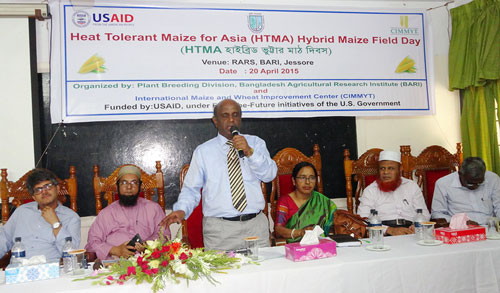CIMMYT’s Heat Stress Tolerant Maize for Asia (HTMA) project held a hybrid maize field day during 21-22 April at the Bangladesh Agricultural Research Institute’s (BARI) Regional Agricultural Research Stations (RARS) in Khoirtola, Jessore and Gazipur. The event was attended by over 60 participants, including local maize farmers, Bangladeshi seed company representatives, agricultural input dealers, Bangladesh government seed system officers and BARI maize researchers.

in HTMA’s hybrid field day held in Jessore, Bangladesh. Photo: BARI.
Maize is the third most important food crop in Bangladesh after rice and wheat, covering from 3,000 hectares (ha) in 1990 to over 300,000 ha at present. This growth is largely demand driven, as maize is used both as feed (poultry, fish and cattle) and food. Annual maize demand in the country is approximately two million tons, with domestic production meeting only about 14% of that. Almost all maize grown is hybrid maize, and about 6,500 metric tons of hybrid seed are required annually. However, only about 15% of annual seed demand is met by domestic seed production; the rest is imported, mainly from India. Bangladesh must enhance domestic sources of hybrid seed to meet demand more reliably and at a lower cost.
To accelerate hybrid maize production and address climate-change effects, BARI joined HTMA in developing and deploying high-yielding, climate-resilient hybrids for stress-prone ecologies across the region. Under the project, which is funded by the United States Agency for International Development (USAID), every two years a new wave of products is available for on-farm testing and deployment. The most recent hybrids were planted at four locations in Bangladesh, including BARI research stations.
HTMA project details and progress were shared with participants during a pre-field visit session by Sirajul Islam, Chief Scientific Officer and Head of BARI-RARS, Jessore. CIMMYT maize breeder P.H. Zaidi discussed HTMA’s potential impact and importance in addressing climate change effects, especially in Bangladesh. Salahuddin Ahmad, BARI’s Principal Scientific Officer, gave an overview of the 24 HTMA hybrids, plus four popular commercial hybrids and two BARI hybrids that were planted in the field. Participants then visited the field sites and evaluated the HTMA hybrids, scoring each one by preference. Of the 30 hybrids, the top 8 were from HTMA. Many participants, including Nurul Hoque, Additional General Manager of the Bangladesh Agricultural Development Corporation (BADC), Nasir Uddin Khan, DAE Additional Director, Jessore Region, and Jalal Uddin, BARI Director of Research, expressed the need to increase domestic maize production to minimize imports and maintain food security and self-sufficiency.
Sadananda explained the importance of public and private sector partnerships for successful development and deployment of the HTMA hybrids. T.P. Tiwari also stressed the need for maize diversification to achieve sustainable production and the need to develop salt tolerant varieties. B.R. Banik, BARI Training and Coordination Director, said the newly developed HTMA hybrids will help Bangladesh deal with climate change effects currently and in the future.
Rafiqul Islam Mondal, BARI Director General, highlighted HTMA’s progress and the need to explore the potential for cultivating maize in unutilized areas to boost production.
“It is truly exciting to see the enthusiasm of stakeholders,” said Mohammad Amiruzzaman, Chief Scientific Officer of BARI’s Plant Breeding Division, in his concluding remarks. “We will work on finalizing the best-bet products, officially register and then deploy them in collaboration with our seed company partners.”
Other participants included representatives from Lal Teer Seed Ltd., Supreme Seed Company Ltd., ACI Ltd., Krishi-bid Group, Monsanto Bangladesh Ltd., Syngenta, Petrochem Ltd., the Bangladesh Rural Advancement Committee (BRAC), Christian Commission for Development in Bangladesh (CCDB), Katalyst, BADC and the Department of Agricultural Extension (DAE). CIMMYT representatives included T. P. Tiwari, CIMMYT-Bangladesh Country Liaison Officer, P.H. Zaidi, Senior Maize Physiologist and HTMA Project Leader, and A.R. Sadananda, Seed System Specialist.
 Capacity development
Capacity development 
